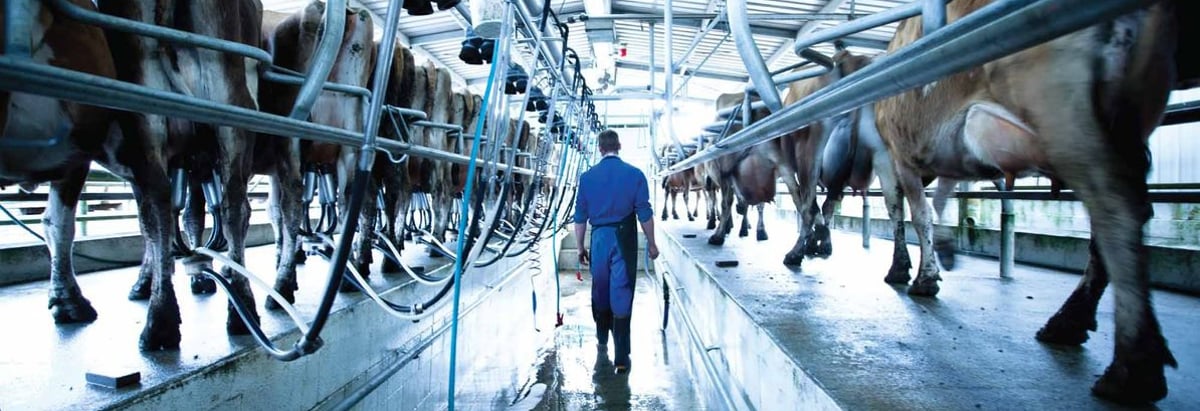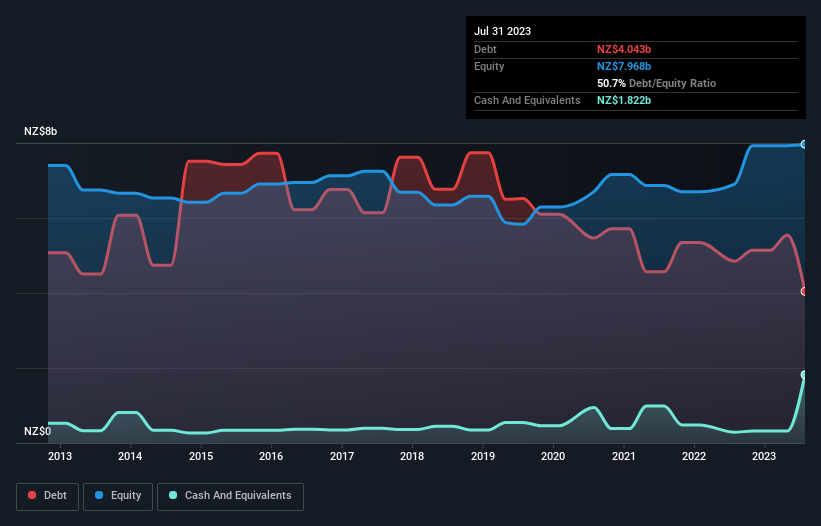
Legendary fund manager Li Lu (who Charlie Munger backed) once said, 'The biggest investment risk is not the volatility of prices, but whether you will suffer a permanent loss of capital.' So it might be obvious that you need to consider debt, when you think about how risky any given stock is, because too much debt can sink a company. We note that Fonterra Co-operative Group Limited (NZSE:FCG) does have debt on its balance sheet. But should shareholders be worried about its use of debt?
What Risk Does Debt Bring?
Debt assists a business until the business has trouble paying it off, either with new capital or with free cash flow. In the worst case scenario, a company can go bankrupt if it cannot pay its creditors. However, a more frequent (but still costly) occurrence is where a company must issue shares at bargain-basement prices, permanently diluting shareholders, just to shore up its balance sheet. Of course, the upside of debt is that it often represents cheap capital, especially when it replaces dilution in a company with the ability to reinvest at high rates of return. When we examine debt levels, we first consider both cash and debt levels, together.
See our latest analysis for Fonterra Co-operative Group
What Is Fonterra Co-operative Group's Net Debt?
The image below, which you can click on for greater detail, shows that Fonterra Co-operative Group had debt of NZ$4.04b at the end of July 2023, a reduction from NZ$4.85b over a year. However, it does have NZ$1.82b in cash offsetting this, leading to net debt of about NZ$2.22b.

How Strong Is Fonterra Co-operative Group's Balance Sheet?
The latest balance sheet data shows that Fonterra Co-operative Group had liabilities of NZ$7.26b due within a year, and liabilities of NZ$3.37b falling due after that. On the other hand, it had cash of NZ$1.82b and NZ$2.47b worth of receivables due within a year. So it has liabilities totalling NZ$6.34b more than its cash and near-term receivables, combined.
Given this deficit is actually higher than the company's market capitalization of NZ$5.12b, we think shareholders really should watch Fonterra Co-operative Group's debt levels, like a parent watching their child ride a bike for the first time. Hypothetically, extremely heavy dilution would be required if the company were forced to pay down its liabilities by raising capital at the current share price.
We measure a company's debt load relative to its earnings power by looking at its net debt divided by its earnings before interest, tax, depreciation, and amortization (EBITDA) and by calculating how easily its earnings before interest and tax (EBIT) cover its interest expense (interest cover). The advantage of this approach is that we take into account both the absolute quantum of debt (with net debt to EBITDA) and the actual interest expenses associated with that debt (with its interest cover ratio).
With net debt sitting at just 0.92 times EBITDA, Fonterra Co-operative Group is arguably pretty conservatively geared. And it boasts interest cover of 8.3 times, which is more than adequate. On top of that, Fonterra Co-operative Group grew its EBIT by 43% over the last twelve months, and that growth will make it easier to handle its debt. The balance sheet is clearly the area to focus on when you are analysing debt. But it is Fonterra Co-operative Group's earnings that will influence how the balance sheet holds up in the future. So if you're keen to discover more about its earnings, it might be worth checking out this graph of its long term earnings trend.
Finally, a company can only pay off debt with cold hard cash, not accounting profits. So we always check how much of that EBIT is translated into free cash flow. During the last three years, Fonterra Co-operative Group produced sturdy free cash flow equating to 73% of its EBIT, about what we'd expect. This cold hard cash means it can reduce its debt when it wants to.
Our View
Fonterra Co-operative Group's EBIT growth rate was a real positive on this analysis, as was its conversion of EBIT to free cash flow. But truth be told its level of total liabilities had us nibbling our nails. When we consider all the elements mentioned above, it seems to us that Fonterra Co-operative Group is managing its debt quite well. Having said that, the load is sufficiently heavy that we would recommend any shareholders keep a close eye on it. When analysing debt levels, the balance sheet is the obvious place to start. However, not all investment risk resides within the balance sheet - far from it. For instance, we've identified 1 warning sign for Fonterra Co-operative Group that you should be aware of.
If you're interested in investing in businesses that can grow profits without the burden of debt, then check out this free list of growing businesses that have net cash on the balance sheet.
New: AI Stock Screener & Alerts
Our new AI Stock Screener scans the market every day to uncover opportunities.
• Dividend Powerhouses (3%+ Yield)
• Undervalued Small Caps with Insider Buying
• High growth Tech and AI Companies
Or build your own from over 50 metrics.
Have feedback on this article? Concerned about the content? Get in touch with us directly. Alternatively, email editorial-team (at) simplywallst.com.
This article by Simply Wall St is general in nature. We provide commentary based on historical data and analyst forecasts only using an unbiased methodology and our articles are not intended to be financial advice. It does not constitute a recommendation to buy or sell any stock, and does not take account of your objectives, or your financial situation. We aim to bring you long-term focused analysis driven by fundamental data. Note that our analysis may not factor in the latest price-sensitive company announcements or qualitative material. Simply Wall St has no position in any stocks mentioned.
About NZSE:FCG
Fonterra Co-operative Group
Fonterra Co-operative Group Limited, together with its subsidiaries, collects, manufactures, and sells milk and milk-derived products.
Flawless balance sheet established dividend payer.

